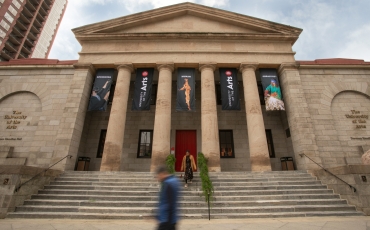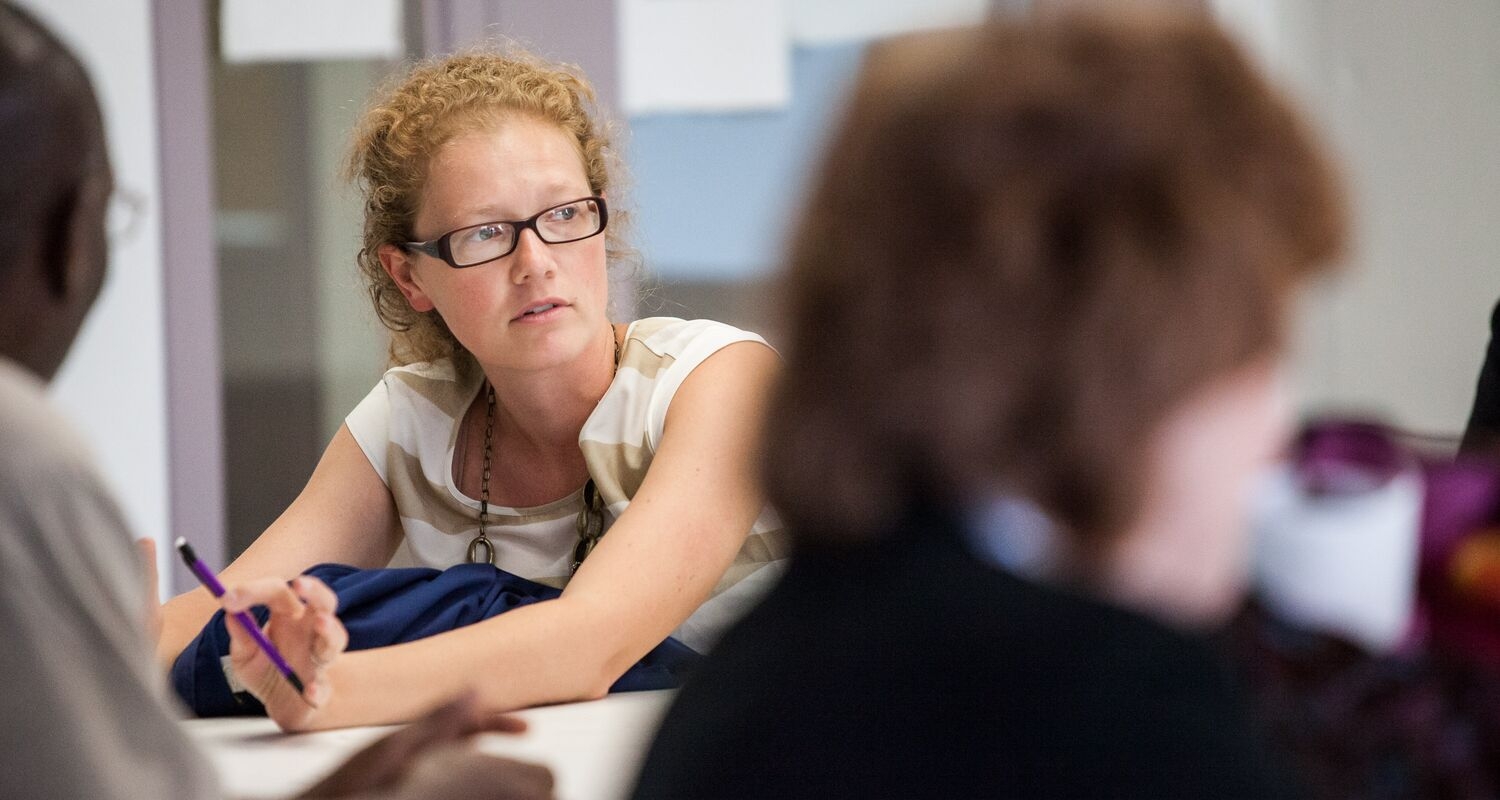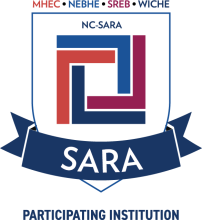Educational Technology (Online MEd)
Deepen your expertise in the integration of technology in the classroom.
Through the use of creative technology in the classroom, teachers can set themselves apart as innovators in our rapidly changing world. In light of the COVID-19 pandemic, teachers around the world were forced to rethink their relationships with technology and to adapt to new platforms like Zoom, Google Classroom and Microsoft Classroom. Technical literacy, which has always been a powerful asset in any teacher’s toolkit, has stepped into the spotlight as a make-or-break skill for educators.
The fully online Master of Education in Educational Technology is a 30-credit degree program designed to deepen your expertise in the integration of technology into your classroom. Aligned with International Society for Technological Education (ISTE) standards, the curriculum is designed by leaders in the field with hundreds of years of collective classroom experience. Elective offerings are market-responsive and evolve with the fast-paced field of educational technology.
Educational Technology Program Format
-
Small, intimate cohort with amble opportunity for collaboration
-
Application-based, hands-on learning in project-based classes
-
Elective courses that allow students to tailor their study to their professional interests
-
Culminating capstone experience
Graduates of the Educational Technology Master’s Degree program should be able to
-
Integrate technology into the design of teaching and learning environments.
-
Feel comfortable with the use of a variety of digital tools in the classroom.
-
Gain and sustain student engagement through the use of innovative technologies.
-
Understand how to optimize educational technology to assess student achievement.
-
Identify educational technology tools to match unique student populations.
-
Shape a code of ethics within a tech-infused world.
-
Investigate topics relevant to their own teaching experiences through research, creativity, and technology.
University of the Arts has been approved to participate in the National Council for State Authorization Reciprocity Agreements.
Request More Information
Master of Education in Educational Technology Curriculum
Required Courses: 21 credits
- Designing 21st Century Learning Environments (3 credits)
- Integrating Educational Technology Into Student Assessment (3 credits)
- Differentiated Instruction Using Educational Technology (3 credits)
- Ethics in Educational Technology (3 credits)
- Research Methods (4.5 credits)
- Capstone Project: Master of Education (4.5 credits)
Electives: 9 credits
-
Select 2 courses from the subject area of Educational Technology (6 credits)
-
Select one course from the following subjects: Educational Technology, Inclusion, Literacy or The Arts (3 Credits)
Explore the Full Curriculum
Faculty Spotlight
Contact Educational Technology Program Director Natalie Duvall at nduvall@uarts.edu
Student Spotlight
Alumni Spotlight
How to Apply
Who Should Apply
The Online Master of Education in Educational Technology is designed for K–12 in-service teachers. This program does not lead to Pennsylvania Department of Education certification. Applicants should have at least one year of experience as a PK–12 educator.
University of the Arts is authorized by the Commonwealth of Pennsylvania to grant degrees in the visual, performing and related arts, and is accredited by the Middle States Commission on Higher Education.
Application Deadline
Spring 2024 priority deadline: Applications received by Oct. 15 will be among the first considered for admission. We will not accept any applications or materials after Jan. 9.
Summer 2024 priority deadline: Applications received by Feb. 1 will be among the first considered for admission. We will not accept any applications or materials after May 12.
Fall 2024 priority deadline: Applications received by Feb. 15 will be among the first considered for admission. We will not accept any applications or materials after August 12.
Review graduate tuition, financial aid and scholarship information.
Application Requirements
-
$60 nonrefundable application fee
-
If the cost of the application fee is a barrier, contact Admissions to request a fee waiver code.
-
-
Official undergraduate transcript
-
Official transcripts must be sent directly from the college where you have earned, or will earn, your undergraduate degree by mail, email or a secure electronic document-delivery service.
-
If you have earned, or will earn, your undergraduate degree outside the U.S., see our transcript requirements for international graduate applicants below.
-
-
Two letters of recommendation
-
Two letters of recommendation from professors or professionals in your field, who are familiar with your capabilities, are required. In the case that these recommenders are not available, you may request letters from colleagues, collaborators or peers, if necessary.
-
Applicants must enter contact information for their recommenders on the application. An email will be sent to recommenders providing a link for them to upload their letter. Letters of recommendation may also be submitted by the recommender via email to gradcredentials@uarts.edu.
-
-
Statement of intent
-
Statements should be a minimum of one to two pages and detail your professional plans, interests and goals. What are your personal and professional goals in applying to this program? In what ways do you hope this program will help you grow as an educator?
-
Your statement of intent may be uploaded during the application process or added after submission via your applicant status portal.
-
-
Résumé
-
Your résumé should highlight all your professional accomplishments, including employment, internships, honors, exhibitions and publications.
-
Your résumé may be uploaded during the application process or added after submission via your applicant status portal.
-
International Applicants
In addition to the requirements listed above, international applicants or those with foreign credentials must submit
-
Official undergraduate transcripts
-
Applicants who have academic documents from institutions outside the U.S. are required to provide original, attested or certified true copies of academic records from the institution where they have earned, or will earn, their undergraduate degree. These records should be in the original language in which they were issued.
-
For postsecondary school records that are not in English, applicants must also submit an official translation of all their academic documents. Translations must be a complete, literal, word-for-word translation in the same format of the original academic document. Transcripts cannot be translated by the student or any members of their family. Acceptable translators include English teachers or other school officials, professional translators, or a local EducationUSA office.
-
Admissions might request that students obtain a course-by-course credential evaluation if we are not able to confirm the equivalent level to a U.S. undergraduate degree.
-
-
Proof of English proficiency
-
For international applicants whose primary language is not English, and who have not completed two semesters of college-level English in a college/university where the language of instruction is English, proof of English proficiency is required.
-
Recommended minimums for English proficiency exams are as follows.\
- TOEFL iBT: 79
- TOEFL essentials: 8.5
- IELTS: 6.5
- Pearson PTE Academic: 53
- Duolingo: 100
-
Applicants who meet the academic and creative requirements for admission but whose scores do not meet the English proficiency requirement for degree study might receive an offer of conditional admission that requires enrollment in the university’s English as a Second Language Institute (ESLI). Applicants who successfully complete ESLI will then be able to begin their degree program studies in the fall semester.
-
In special circumstances, applicants who do not have access to the TOEFL, IELTS or Duolingo English tests can request a waiver of this requirement. The request should be submitted by email to admissions@uarts.edu. Requests will then be reviewed on a case-by-case basis and might require an interview.
-
Tuition & Financial Aid
Costs for the online Master of Education in Educational Technology include
-
$23,490 tuition ($783/credit hour for 30 hours)
-
A $50 fee that covers course resources, including software
-
A $100 fee for in-person studio arts courses
-
A stable and fast internet connection, a computer camera and access to Microsoft (These resources are the student’s responsibility.)
Financial Aid
Some students may be eligible for financial aid. A minimum of 4.5 credit hours per semester is required for financial aid eligibility. Students are required to be constantly enrolled to be financial aid–eligible.
FAQ
Frequently asked questions about the Master of Education in Educational Technology program.
There are many professional occupations in the field of educational technology, such as instructional designer, e-learning developer, educational technologist, curriculum developer, tech
The integration of technology in education enhances teaching and learning experiences, promotes student engagement, facilitates personalized learning and provides access to a wide range of resources. However, it is essential to consider thoughtful implementation, pedagogical strategies, and maintaining a balance between technology and other instructional approaches.
The value of a Master’s degree in Educational Technology depends on individual career goals, interests and the specific opportunities available in the field. With the increasing importance of technology in education, obtaining a Master of Education degree in Educational Technology can provide you with specialized knowledge and skills, potentially expanding your career prospects and advancing your professional growth.
Get Started
Start your application
Begin your application today. Our admissions team will help you throughout the process.

See UArts for yourself
The best way to get to know UArts is by visiting our campus in person. Come see a show, visit a gallery, and get to know the neighborhood.














